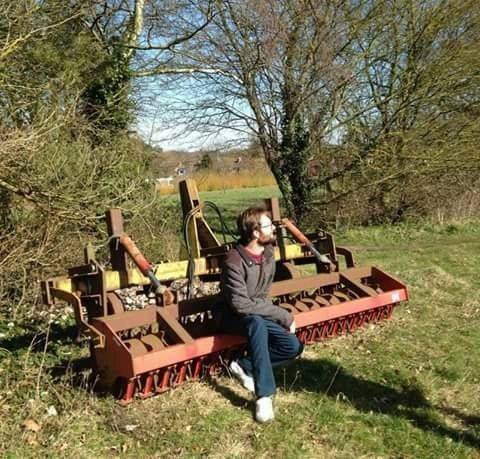Darwin Hickman - PhD student
Contact
[email protected]
Rothamsted Webpage
Research summary
Black-grass (Alopecurus myosuroides) is a serious weed of agricultural land, particularly wheat fields, in much of Northern Europe, and its widespread and rapidly-developing herbicide resistance is of great detriment to control efforts in these areas. With this in mind, it is necessary to examine alternative options for black-grass control. One of these options is allelopathy, the detrimental chemical interactions between plant species. It is already known that wheat has allelopathic potential, so it is desirable to determine how effective this is at controlling black-grass, how we can enhance this effect, and whether black-grass has any response to this.
I am undertaking a PhD based at Rothamsted Research in conjunction with the University of Nottingham entitled ‘Getting to the roots of Black-grass control: Crop-weed interactions in Alopecurus myosuroides. Throughout this PhD, I am looking to investigate the extent to which wheat allelopathy can be used to control black-grass, and more broadly to create a comprehensive picture of what interactions are taking place between these two species in the notoriously enigmatic ‘black box’ that is agricultural soil. This will involve the growth and measurement of plants in both artificial and natural media, the extraction of allelopathic compounds from those media, and the identification of effective allelochemicals from these compounds. This represents a unique opportunity to combine techniques from the fields of plant physiology, plant ecology, chemical ecology, chemistry, and agronomy, in a manner rarely used in studies of allelopathy.
My Background
Prior to beginning my PhD, I completed an Undergraduate degree in Environmental Sciences at the University of Birmingham, with a placement year at Landcare Research (Manaaki Whenua) in New Zealand. During this time, I was involved in several projects examining the ecological effects of introduced insects for biological control of weeds. It was during this time I was bitten by the bug (figuratively and literally) of alternative weed control methods, as well as gaining an interest in invasive and introduced species and their ecological effects. My dissertation focused on assessing the risk of introduced broom psyllids to the New Zealand native Kōwhai tree through the vectoring of a bacterial pathogen. I then completed a Master of Research degree in Biosciences at Swansea University, attempting to use tree-ring records to identify past outbreaks of an aphid-like insect pest on fir species in the Pacific Northwest of North America. It is these ecologically antagonistic interactions (desired or undesired) between plants and insects which fascinate me, and it is this fascination that has led me to my PhD.
Country of Birth: United Kingdom
Hobbies: Hiking, football, travelling, photography
A weird fact: Due to a confusingly-worded form, I once (accidentally and incorrectly) informed New Zealand Immigration that I was pregnant.
[email protected]
Rothamsted Webpage
Research summary
Black-grass (Alopecurus myosuroides) is a serious weed of agricultural land, particularly wheat fields, in much of Northern Europe, and its widespread and rapidly-developing herbicide resistance is of great detriment to control efforts in these areas. With this in mind, it is necessary to examine alternative options for black-grass control. One of these options is allelopathy, the detrimental chemical interactions between plant species. It is already known that wheat has allelopathic potential, so it is desirable to determine how effective this is at controlling black-grass, how we can enhance this effect, and whether black-grass has any response to this.
I am undertaking a PhD based at Rothamsted Research in conjunction with the University of Nottingham entitled ‘Getting to the roots of Black-grass control: Crop-weed interactions in Alopecurus myosuroides. Throughout this PhD, I am looking to investigate the extent to which wheat allelopathy can be used to control black-grass, and more broadly to create a comprehensive picture of what interactions are taking place between these two species in the notoriously enigmatic ‘black box’ that is agricultural soil. This will involve the growth and measurement of plants in both artificial and natural media, the extraction of allelopathic compounds from those media, and the identification of effective allelochemicals from these compounds. This represents a unique opportunity to combine techniques from the fields of plant physiology, plant ecology, chemical ecology, chemistry, and agronomy, in a manner rarely used in studies of allelopathy.
My Background
Prior to beginning my PhD, I completed an Undergraduate degree in Environmental Sciences at the University of Birmingham, with a placement year at Landcare Research (Manaaki Whenua) in New Zealand. During this time, I was involved in several projects examining the ecological effects of introduced insects for biological control of weeds. It was during this time I was bitten by the bug (figuratively and literally) of alternative weed control methods, as well as gaining an interest in invasive and introduced species and their ecological effects. My dissertation focused on assessing the risk of introduced broom psyllids to the New Zealand native Kōwhai tree through the vectoring of a bacterial pathogen. I then completed a Master of Research degree in Biosciences at Swansea University, attempting to use tree-ring records to identify past outbreaks of an aphid-like insect pest on fir species in the Pacific Northwest of North America. It is these ecologically antagonistic interactions (desired or undesired) between plants and insects which fascinate me, and it is this fascination that has led me to my PhD.
Country of Birth: United Kingdom
Hobbies: Hiking, football, travelling, photography
A weird fact: Due to a confusingly-worded form, I once (accidentally and incorrectly) informed New Zealand Immigration that I was pregnant.
